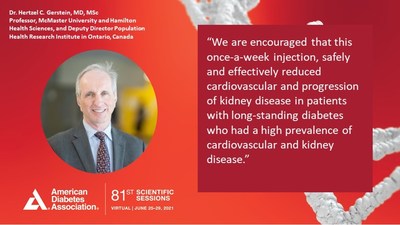Data released today from a large-scale, international clinical trial show significant reduction in the first occurrence of a heart attack, stroke, or death, and a reduction in progression of kidney disease in patients with type 2 diabetes with weekly use of efpeglenatide, an injectable drug with glucose- and weight-lowering effects.
| WASHINGTON, June 28, 2021 /PRNewswire/ -- Data released today from a large-scale, international clinical trial show significant reduction in the first occurrence of a heart attack, stroke, or death, and a reduction in progression of kidney disease in patients with type 2 diabetes with weekly use of efpeglenatide, an injectable drug with glucose- and weight-lowering effects. The findings were presented at the virtual 81st Scientific Sessions of the American Diabetes Association® (ADA) and simultaneously published in The New England Journal of Medicine. The majority (98%) of adults with type 2 diabetes have at least one comorbid chronic condition, including cardiorenal conditions impacting the heart and kidney. In fact, 24% of people living with diabetes have kidney disease, 22% have cardiovascular disease, and 82% of people with diabetes have hypertension—a leading cause of heart disease.1 Efpeglenatide is a glucagon-like peptide-1 receptor agonist drug (GLP-1 RA), a class of drug used to treat diabetes that reduces glucose levels, weight, and blood pressure. Earlier trials have shown that GLP-1 RA drugs based on human GLP-1 reduce cardiovascular and kidney outcomes. This study assessed the effects of a GLP-1 RA based on exendin-4 (animal GLP-1) either with or without an SGLT2 inhibitor drug in patients with cardiovascular and/or kidney disease. The AMPLITUDE O trial was conducted in 28 countries and included more than 4,000 participants with type 2 diabetes. Over two years, patients assigned to weekly injections of efpeglenatide versus placebo had a 27% lower risk of a heart attack, stroke, or cardiovascular death; a 32% lower risk of kidney disease progression; and a 27% lower risk of a heart attack, stroke, or death from any cause. Similar effects were observed in the presence and absence of an SGLT2 inhibitor drug. There were no serious side effects. “The AMPLITUDE O trial establishes efpeglenatide, an exendin-4 based GLP-1 RA, as an effective cardioprotective drug for type 2 diabetes patients with cardiovascular and/or kidney disease,” said Hertzel C. Gerstein, MD, MSc, Professor, McMaster University and Hamilton Health Sciences, and Deputy Director Population Health Research Institute in Ontario, Canada. “We are encouraged that this once-a-week injection, safely and effectively reduced cardiovascular and progression of kidney disease in patients with long-standing diabetes who had a high prevalence of cardiovascular and kidney disease.” Research presentation details:
For more information or to request an interview with Dr. Gerstein, please contact the ADA Scientific Sessions media team at SciSessionsPress@diabetes.org. About the ADA’s Scientific Sessions About the American Diabetes Association 1 Kristy Iglay, Hakima Hannachi, Patrick Joseph Howie, Jinfei Xu, Xueying Li, Samuel S. Engel, Lori M. Moore & Swapnil Rajpathak (2016) Prevalence and co-prevalence of comorbidities among patients with type 2 diabetes mellitus, Current Medical Research and Opinion, 32:7, 1243-1252, DOI: 10.1185/03007995.2016.1168291 Contact: Daisy Diaz, 703-253-4807
SOURCE American Diabetes Association |






